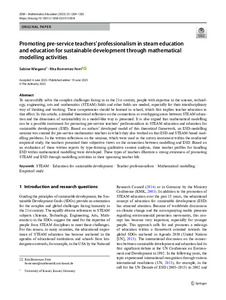| dc.date.accessioned | 2023-12-04T16:14:13Z | |
| dc.date.available | 2023-12-04T16:14:13Z | |
| dc.date.issued | 2023-06-19 | |
| dc.identifier | doi:10.17170/kobra-202312049168 | |
| dc.identifier.uri | http://hdl.handle.net/123456789/15266 | |
| dc.description.sponsorship | Gefördert im Rahmen des Projekts DEAL | ger |
| dc.language.iso | eng | |
| dc.rights | Namensnennung 4.0 International | * |
| dc.rights.uri | http://creativecommons.org/licenses/by/4.0/ | * |
| dc.subject | STEAM | eng |
| dc.subject | Education for sustainable development | eng |
| dc.subject | Teacher professionalism | eng |
| dc.subject | Mathematical modelling | eng |
| dc.subject | Empirical study | eng |
| dc.subject.ddc | 370 | |
| dc.subject.ddc | 510 | |
| dc.title | Promoting pre-service teachers’ professionalism in steam education and education for sustainable development through mathematical modelling activities | eng |
| dc.type | Aufsatz | |
| dcterms.abstract | To successfully solve the complex challenges facing us in the 21st century, people with expertise in the science, technology, engineering, arts and mathematics (STEAM) fields and other fields are needed, especially for their interdisciplinary way of thinking and working. These competencies should be learned in school, which first implies teacher education to that effect. In this article, a detailed theoretical reflection on the connections or overlapping areas between STEAM education and the dimension of sustainability in a model-like way is presented. It is also argued that mathematical modelling can be a possible instrument for promoting pre-service teachers’ professionalism in STEAM education and education for sustainable development (ESD). Based on authors’ developed model of this theoretical framework, an ESD-modelling seminar was created for pre-service mathematics teachers in which they also worked on that ESD and STEAM-based modelling problems. In the written reflections on the seminar, which were used as the survey instrument within the conducted empirical study, the teachers presented their subjective views on the connection between modelling and ESD. Based on an evaluation of these written reports by type-forming qualitative content analysis, three teacher profiles for handling ESD within mathematical modelling were developed. These types of teachers illustrate a strong awareness of promoting STEAM and ESD through modelling activities in their upcoming teacher life. | eng |
| dcterms.accessRights | open access | |
| dcterms.creator | Wiegand, Sabine | |
| dcterms.creator | Borromeo Ferri, Rita | |
| dc.relation.doi | doi:10.1007/s11858-023-01500-8 | |
| dc.subject.swd | Mathematische Modellierung | ger |
| dc.subject.swd | Lehrer | ger |
| dc.subject.swd | Professionalität | ger |
| dc.subject.swd | Bildung für nachhaltige Entwicklung | ger |
| dc.subject.swd | Mathematikunterricht | ger |
| dc.type.version | publishedVersion | |
| dcterms.source.identifier | eissn:1863-9704 | |
| dcterms.source.issue | issue 7 | |
| dcterms.source.journal | ZDM - Mathematics Education | eng |
| dcterms.source.pageinfo | 1269-1282 | |
| dcterms.source.volume | Volume 55 | |
| kup.iskup | false | |


